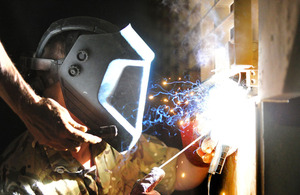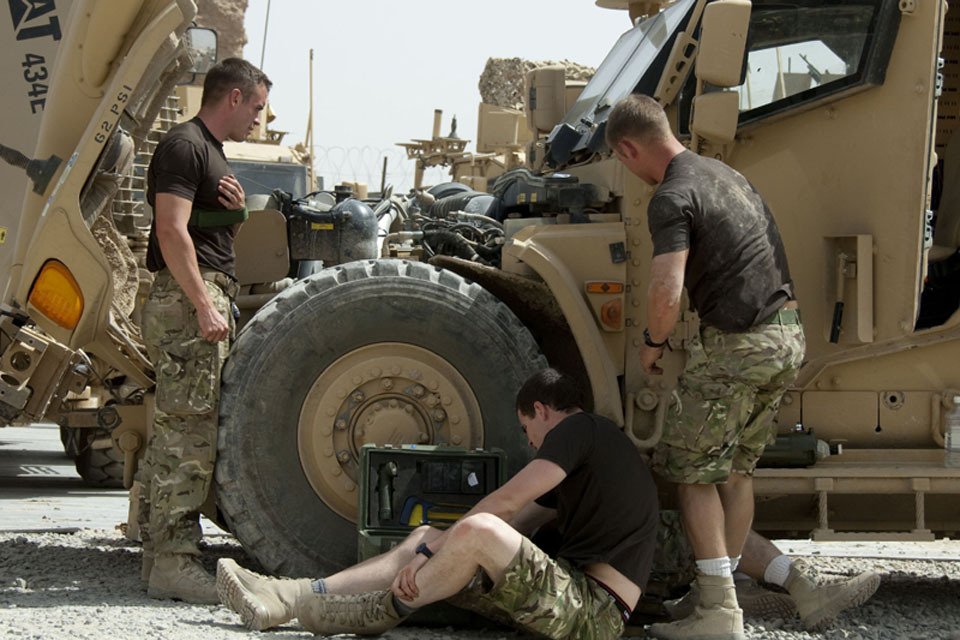Keeping 45 Commando's wheels turning in Helmand
Keeping the wheels turning on vehicles of the 45 Commando Royal Marines Battle Group in the Nad 'Ali (South) area of Helmand province is a team of military engineers. Report by Ian Carr.

An engineer from 45 Commando's Light Aid Detachment makes repairs to a British armoured vehicle [Picture: Crown Copyright/MOD 2011]
45 Commando’s Light Aid Detachment (LAD) is responsible for all the vehicles at Forward Operating Base (FOB) Shawqat, and for those at the patrol bases in their operational area.
They often work late into the night, repairing or bolting new kit onto Mastiffs, Huskies, Jackals, Ridgbacks, Wolfhounds and quad bikes. Their forecourt would be the envy of any hardcore four-by-four fanatic.
Engineering support in theatre aims to provide sufficient levels of expertise and equipment to make sure repairs and maintenance take place as far forward as possible. If a vehicle at a patrol base needs fixing, the LAD will send a guy over to help.
There are two heavy-lift vehicles at the team’s disposal to recover any big vehicles that have been damaged and which can’t be repaired at the roadside:
Stuff sliding off the road or being hit by IEDs [improvised explosive devices] are our bread and butter,” said Corporal Joe Williams.
One such bread and butter moment came early in the tour when they had to recover a 36-tonne Warrior that had ended up on its side:
Our expertise has built up from working on these vehicles. The equipment has all moved on so much we’ve really had to raise our game,” said Captain Phil Hobbs.

Engineers from 45 Commando's Light Aid Detachment prepare to get to work on a Husky in Helmand [Picture: Crown Copyright/MOD 2011]
To top up their knowledge of the vehicles they would be working on, after their Reception, Staging and Onward Integration training (the training that all personnel receive at Camp Bastion when they first arrive in theatre) the guys took the opportunity to drop in on their colleagues in Engineering Services to spend a couple of days picking up tips on the main problems they might face.
In return, Engineering Services are keen, whenever the opportunity arrives, to rotate their staff through the FOBs to broaden their experience:
In the first six weeks what kept us busy was dealing with generators that were falling over,” said LAD Staff Sergeant Rob Bettes. “Often it was just a case of teaching people how to look after them, and make sure they were filled up from time to time. We also advise the Royal Marines how to look after their vehicles too.
Attending to the needs of big military vehicles can be tough enough at the FOB, but, when they are stranded out in the countryside, the job gets harder still:
We had to go and recover a Ridgback that had turned over in a ditch,” said Corporal Williams. “There were eight contacts in one day, and by the evening the crew were still dismounted; they provided cover for us while we sorted it out.
The most difficult problem the engineers face during the summer months is the heat; working on the hardstand becomes almost impossible in the afternoons:
Unless it’s critical we stand down for a couple of hours, or work on smaller jobs we can do in the shade,” said Corporal Williams, busy sitting on the floor of the tent sticking light-reflecting strips to various pieces of equipment.
The heat also affects the power generators so we tell the guys to put them in the shade and keep the loads down, like switching off the lights and air con when they are not needed, to stop them overheating.
Bugs and sandstorms,” shouts a voice from the corner, reminding Corporal Williams that there are yet other conditions that test the engineers’ endurance when putting battle-winning equipment back on the road.
But it’s not all battle damage or the tolls taken on the vehicles from the harsh driving conditions that occupy these engineers. Recently they had to fit new seat belts to more than 30 vehicles:
After the first couple it took us about a couple of hours per vehicle once we got the hang of it, and worked out the best way to do it,” said Corporal Williams.
Having a strong grasp of engineering principles, an encyclopaedic knowledge of the vehicles they work on and an ability to adapt are all essential qualities for the LADs.
When they were called on to fit some of the vehicles in Shawqat with the new QuickShield lightweight net - described as a ‘band aid for bar armour’, a kind of hairnet strong enough to protect against rocket-propelled grenades, used to rapidly replace damaged bar armour on military vehicles in the field - they were up for the challenge.
And when it comes to the end of their tour they will go back to Bastion armed with kit bags full of photos to back brief their colleagues at Engineering Services so that the knowledge will live on and so that the next LADs will know what to expect.